Technology and Health Literacy for Older Adults
Autonomy as Principle for Designing Service Experience
As the elderly population increases, their technology and health illiteracy are becoming social problems because those problems hinder them from accessing service networks that are increasingly mediated by information technology and mobile devices. Technology literacy is a pre-requisite for autonomy because it is the infrastructure for people to make better sense of the world to plan out their actions. Additionally, health literacy is also the priority for autonomy because it is the first issue to maintain the wellbeing of older adults.
This project contains a series of sub-projects targeting on understanding the barriers of older adults accessing to technology and health literacy from ethnographic and statistical studies and exploring different design interventions ranging from gamifications, workshops, and user experience prototypes. The project is implemented in different places and collaborated with professors and researchers from Northeastern University in Boston, America and Hohai University in Jiangsu province, China. Prof. Miso Kim is the primary investigator who leads studies in Boston city, America. Prof. Canqun He is the co-investigator who leads studies in Jiangsu province, China. As the research assistant of the project, I mainly led the statistical analysis and design research studies in the Research phase and the gamification in the Design phase.
Publications & Presentations
[Paper] Houjiang Liu, Miso Kim, Canqun He, Thomson Tia. “Autonomy as Design Principle: Service Design for the Technology Literacy of Older Adults” In Proceedings of Cumulus: Design Culture(s), Rome, Italy, June 2021 Paper
[Poster] Houjiang Liu, Miso Kim, Anni Xu, Marina DiPiazza, Nirban Bhatia, Mingzhu Li, “Participatory Design for Senior Healthcare: Service Design to Improve Seniors’ Health Literacy and Autonomy”, Research, Innovation, Scholarship, Entrepreneurship (RISE), 2020 Poster
[Poster] Houjiang Liu, Survey Data Results, 2019 Data report
Technology Literacy
In this study, we conducted ethnographic research to understand the factors and patterns of older adults’ autonomy in relation to technology, including a survey of 94 participants and 20 interviews in Boston (FIG 1) and a survey of 151 participants and 20 interviews in Jiangsu. Using key insights from our research, we designed a preliminary service system to support seniors' adoption of rapidly changing technologies, while maintaining their sense of autonomy. The service system includes workshops with board games, self-learning toolkits, and technology learning courses ranging from beginner to intermediate levels. Those tools and community-based courses connected seniors with student volunteers, community centers, and local libraries.
In the research phase, I used exploratory factor analysis and cluster analysis to find patterns that participants share in the survey and understand how older adults' autonomy and participations influence their technology adoption. First, we found main factors from the question which demonstrate representative features of seniors, including seniors who have strong leadership qualities, who are tech-savvy and who feel positive in learning technology. In total, we concluded ten main features from their responses. Second, three groups of respondents are clustered with similar responses to those characteristics. From the statistical survey analysis, we understood there are three main groups from our participants with different autonomy and participation levels. Then, in our design research, we built three personas based on the similar characteristics of the groups.
Inspired by the interviews with seniors, we found that game might be a good leverage point to enhance seniors’ technology learning. In the design phase, I gamified the learning process based on their learning curves. We created three games which targeted on beginner level, intermediate level, and advanced level of learning. These games have been tested with nine community volunteers (FIG 2).
Apart from games, we also designed other service touch points to build our service blueprint, including workshops and digital applications for older adults. To explore different app ideas, I assigned group project in my teaching class: ARTG 2401 interaction design tools, for undergrads to brainstorm and prototype different apps based on the levels of technology learning. In the class, we came up with three app ideas: first is to gamify the process of learning technical terminology, second is to create references to track progress and materials for offline learning workshops, third is to create a communication portal for older users to easily connect with community volunteers. Instructed by the wireframe and app workflow (FIG 3), students prototyped their app ideas and tested with professional UX designers who have worked for Microsoft, Baidu, and Thomson Reuters (FIG 4).
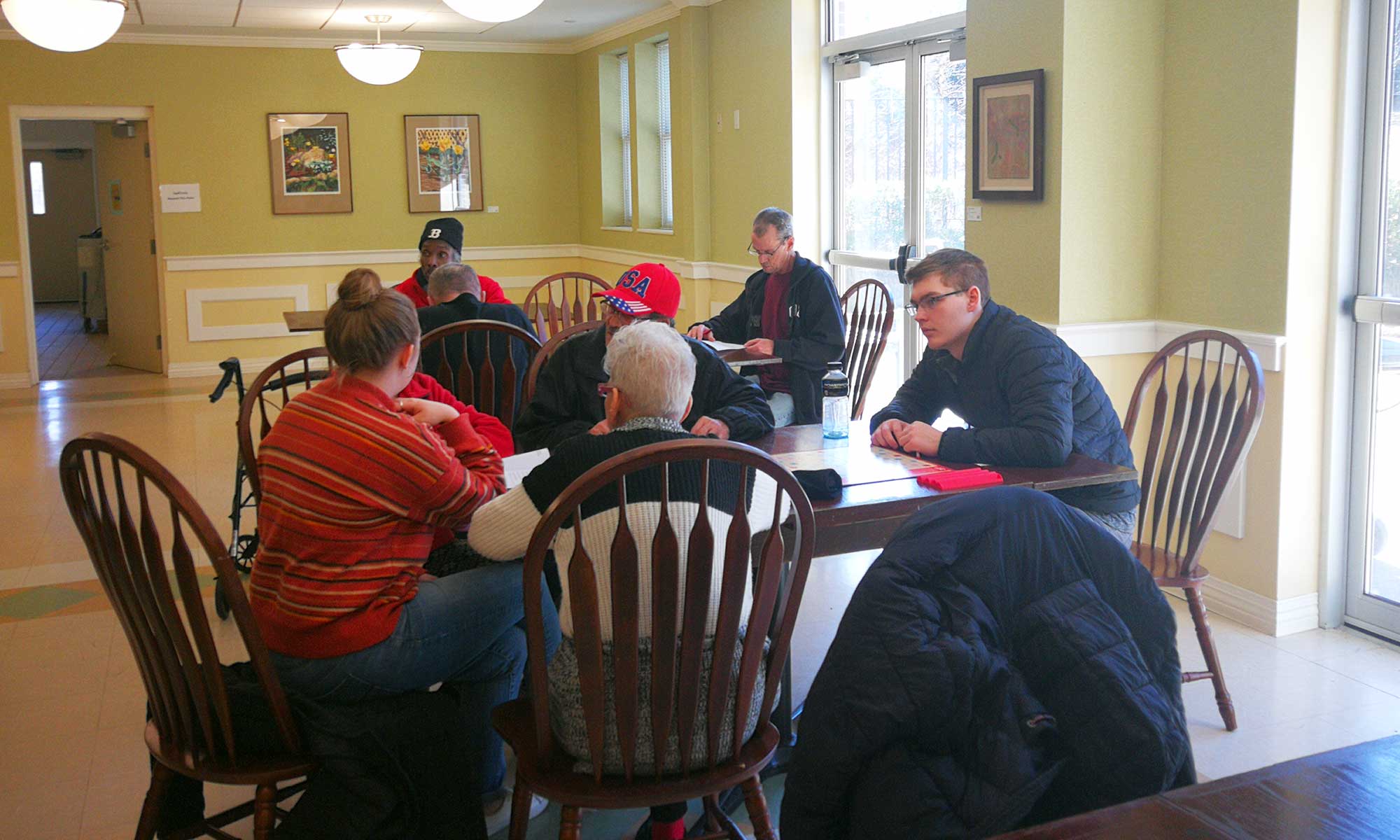
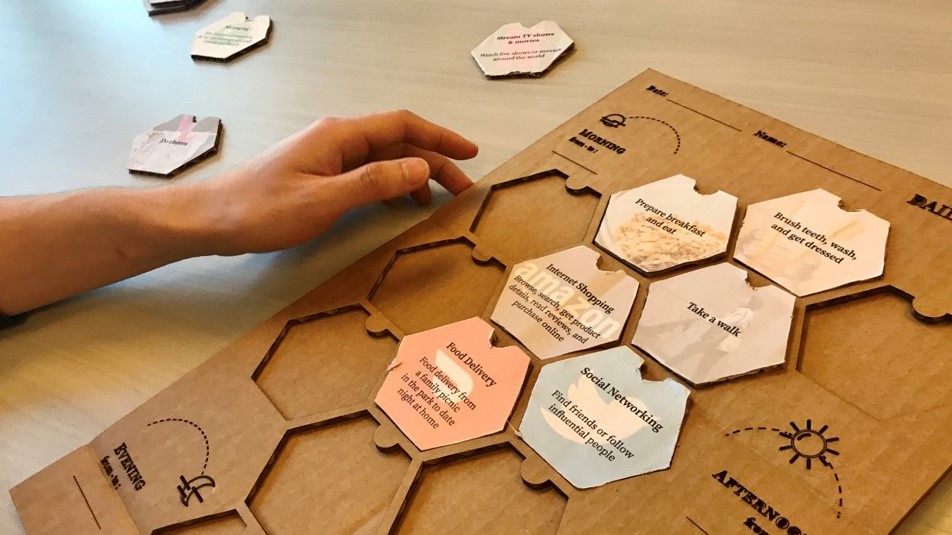
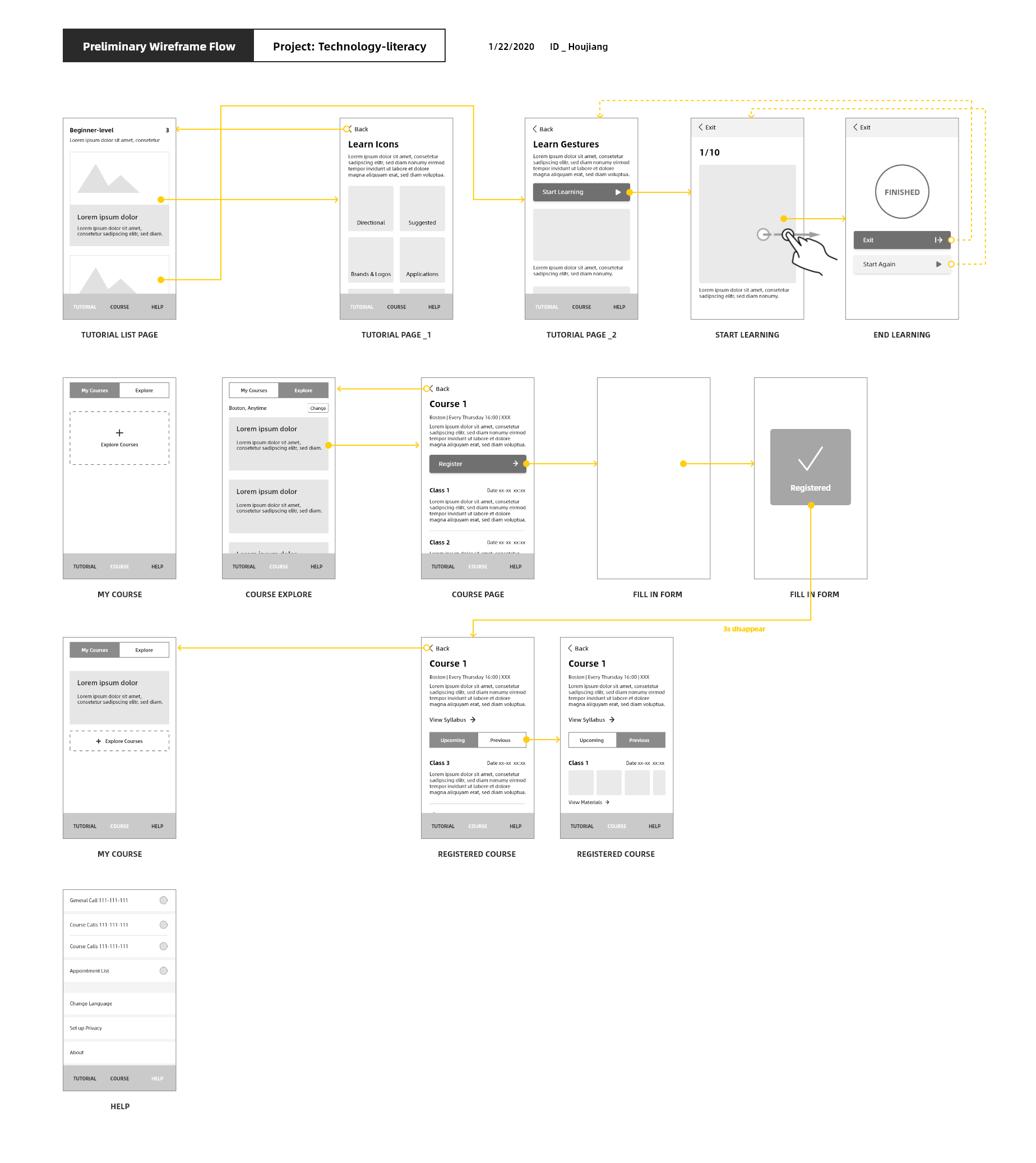
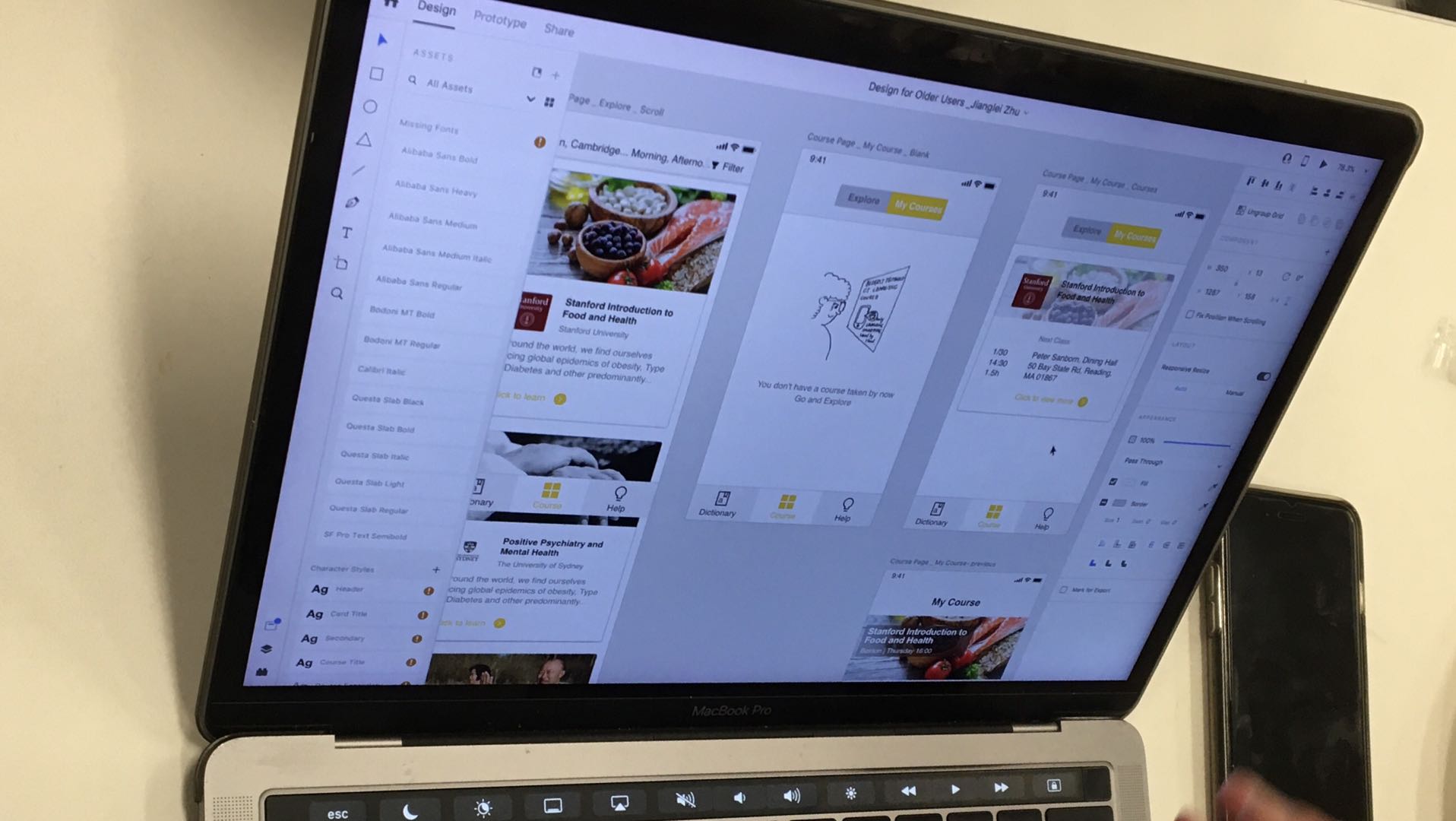
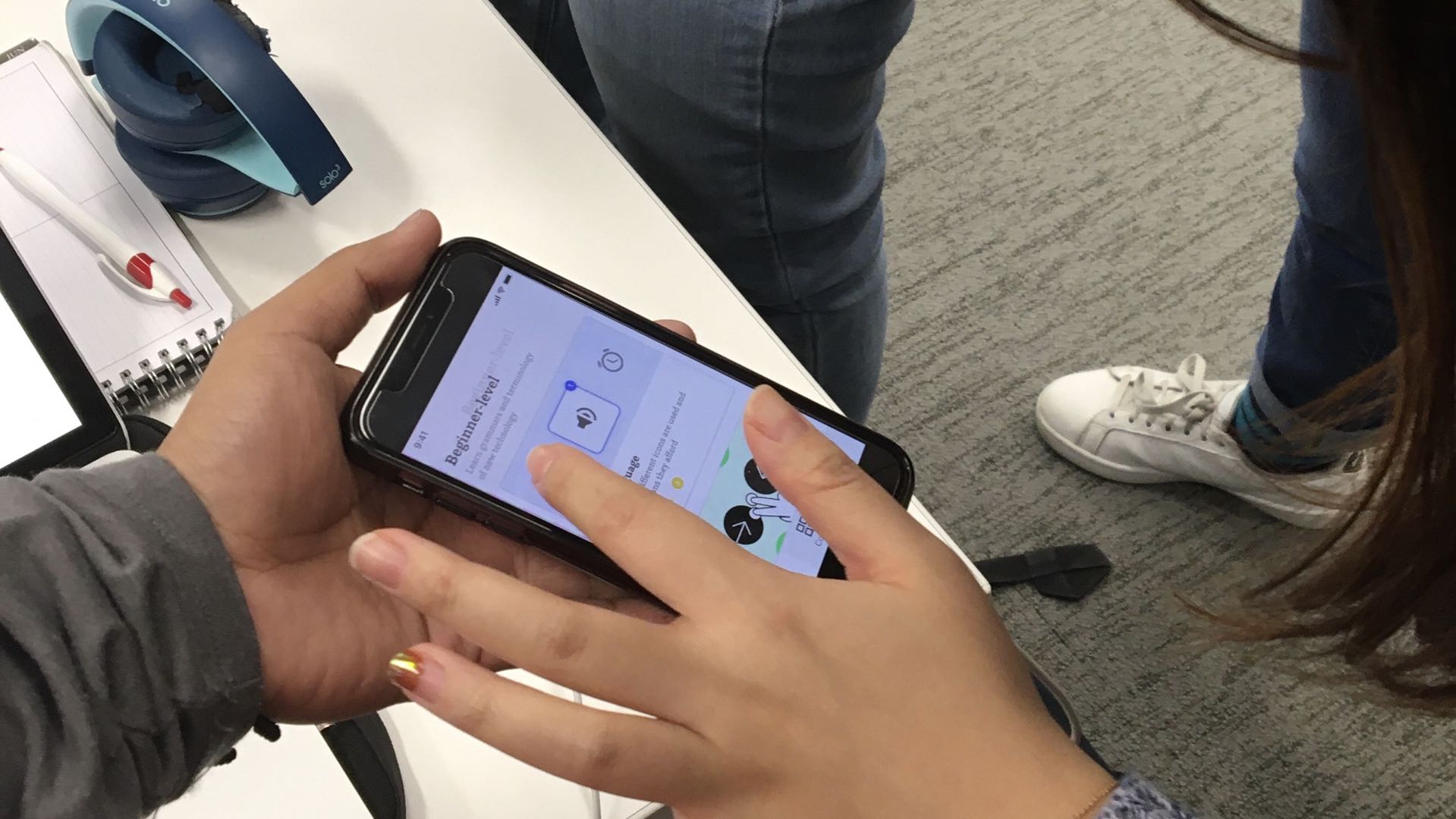
Health Autonomy
In relation to the study of health autonomy for older adults, we examined current difficulties in their health management by a healthcare experience walkthrough and designed community healthcare toolkits to support their health decision-making process. We interviewed 20 participants, including seniors and caregivers, and conceptualized seniors’ behavior patterns in terms of their barriers and motivations in using technology and healthcare.
In this project, I mainly conducted the interviews and designed the participatory workshop. In the first workshop, I designed several toolkits, including probes cards and templates for community assistants to brainstorm solutions to the most pressing issues affecting the daily health of seniors. In the second workshops, I designed codesign toolkits for seniors to develop self-learning courses. Some results have been presented as a poster in the RISE conference.

Nowadays, the group is working with the Peabody Property, a real estate company who provides affordable housing and seniors community services to implement the service ideas, tools, games, and workshops from the technology literacy projects and the health autonomy project to help seniors get through the difficult time when they are isolated during covid-19.
